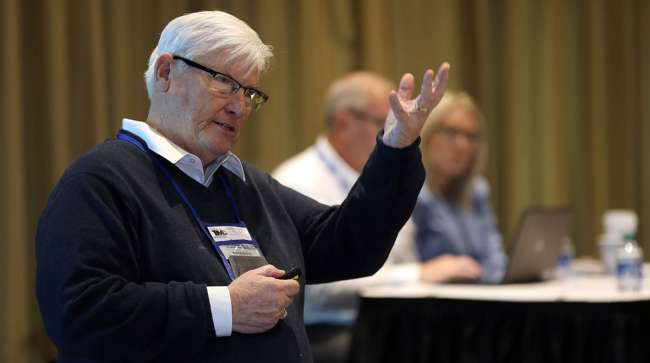Staff Reporter
Fleet Maintenance Group Creates Task Force on Hiring Veterans

[Stay on top of transportation news: Get TTNews in your inbox.]
ATLANTA — The Technology & Maintenance Council’s study group on fleet maintenance management created a new task force to focus on hiring military personnel for trucking industry roles.
TMC, which operates under American Trucking Associations, includes task forces that are transient groups meant to solve problems and then dissolve within a period of about two years.
Kirt Weaver, senior account manager for Hadley, presented the case to turn the exploratory committee on hiring military personnel into an actual task force Feb. 24 at a session of TMC’s annual meeting. Hadley is a component supplier for the truck, trailer and military markets.
Weaver, who served eight years in the Michigan Army National Guard as a wheeled vehicle mechanic, said that many military jobs require knowledge of how to operate a heavy vehicle. He identified veterans’ flexibility and skill sets as qualities that make them good candidates for the trucking industry.
“You can go online and see a number of reasons for hiring veterans,” Weaver told Transport Topics. “Let’s use TMC to leverage that into our industry. Hopefully, we have quite a few people come up and volunteer and get involved with it and we will see where it leads.”
The fleet maintenance management group held sessions throughout the day Feb. 24. In an earlier session, Amanda Schuier, chair of the study group, recommended that the group’s task force dedicated to the internet of things reset their approach to addressing this subject.
Schuier, who also is senior vice president of Quality Transport Co., said the IoT task force has been working for about 2½ years. Quality Transport Co. is a trucking company based in Freeport, Ill.
Although she emphasized that the task force is not disbanding, she said the group will not hold another open meeting until it forms a framework.
“We need some terminology,” Schuier said before a crowd of industry professionals. “We need a use case. We need a framework.”
Schuier welcomed session attendees who are interested to participate in the effort to create a framework.
Because IoT is such a broad issue, creating standards and addressing individual fleet needs can be a challenge. The complexities of IoT were reflected in comments from many of the session’s participants. One person discussed the first initial in IoT, emphasizing the difference between “internet” and “intranet.” Another attendee suggested IoT should stand for “internet of trucking” in discussions pertaining to the industry.
In another session, participants advanced guidelines regarding key performance indicators for maintenance operations. Attendees motioned to move the recommended practice (RP) document to the balloting stage. This means the RP will work its way through the task force’s leadership and be made available to TMC members for comment.
Lew Flowers, president of Flowers Fleet Services in Oklahoma City, addressed a packed room to discuss the RP’s details. The 10 key performance indicators covered subjects such as preventive maintenance inspection completion, unscheduled roadside maintenance, uptime and Driver Vehicle Inspection Reports.
“The purpose of this was to get you, as a fleet maintenance manager, a way to look at your operations,” Flowers said.
The key performance indicator on technicians’ labor accountability takes into account labor hours and paid hours. Flowers explained that a technician’s work order hours, such as a 40-hour week, should match his or her timecard hours.
“Before you have productivity, you’ve got to have accountability,” Flowers said.
New this year was a session on the group’s task force on technician apprenticeship standards, which was officially formed in September under Kenneth Calhoun, fleet optimization manager for Altec Service Group and general chairman and treasurer of TMC.
Bill Kraus, Georgia director for the U.S. Department of Labor’s Office of Apprenticeship, was introduced as a special guest and discussed different apprenticeship opportunities. Kraus said 550,000 apprentices participate in 20,000 apprenticeship programs nationwide every year.
“There may be plenty of workers out there, but those workers don’t have the skills you need,” Kraus said. “You have to train. You have to invest in your workforce.”
Want more news? Listen to today's daily briefing:



